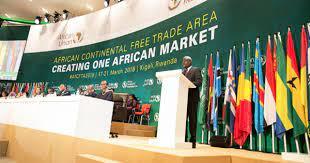
The Agreement establishing the
African Continental Free Trade Area (AfCFTA) was signed in Kigali (Rwanda) on
March 21, 2018. Its objective is to achieve the integration of Africa by
serving as an engine of: growth economic, industrialization and sustainable
development in Africa (in accordance with the 2030 Agenda adopted by the United
Nations General Assembly and the African Union (AU) Agenda 2063 for “The Africa
We Want”).
The AfCFTA is expected to be the
world's largest common market in terms of membership since the creation of the
World Trade Organization (WTO). If launched by all 55 states, it will cover
more than 1.2 billion people and the United Nations Economic Commission for
Africa (ECA/UNECA) estimates that the AfCFTA could boost intra-African trade by
35 billion dollars in 2022 and increase continental exports by 6%.
For Burundi, the AfCFTA Agreement was signed on July 2, 2018 in Nouakchott in Mauritania, and in this process of commercial opening at the continental level, Burundi has made considerable progress. We cite in particular the ratification of the AfCFTA Agreement on 06/17/2021; the national strategy for implementing the AfCFTA has been developed and validated. This autonomous national strategy is part of Burundi’s efforts in seeking commercial performance and trade facilitation.The AfCFTA represents a window of opportunity for African countries to promote intra-African trade, diversify and structurally transform the continent's economy. It is also about pursuing important objectives in terms of human rights and the fight against poverty. However, harmonization of national priorities aimed at achieving regional goals and global public goods will require strong political will, determination and coordination of efforts by African political leaders.This involves large-scale dissemination and popularization efforts so that all stakeholders are informed of the expectations of the ZLECAF and make effective appropriation of it. It is in this context that the CDE initiated the project entitled “Unlocking the potential of trade in Burundi” which aims to promote the implementation of the ZLECAF as a solution to the creation of employment and opportunities for all in Burundi.What importance for Burundians?For Professor Dr Salomon Nsabimana, macro economist and expert in strategic planning, overall, Burundi's entry into the AfCFTA portends significant opportunities which concern both trade with several African countries and their security. With membership of the AfCFTA, this professor reveals 6 major opportunities available to Burundi.
The strengths of Burundi's competitiveness within the framework of the AfCFTA are based in particular on agricultural products (coffee, tea, pepper, banana, avocados, beans, banana wine, pineapple wine, ornamental plants); mining products (Gold, coltan, olframite); breeding products (honey and wax); tourism (Tourist sites, good climate, Burundian drum, Karera Falls, Mugara thermal waters, Kigutu hospital, RUHWA thermal water, RUGAZI, Lake TANGANYIKA, DOGODOGO, KIBIRA natural forest, RUSIZI national park, Pierre Livingstone & Stanley , fishing products (fish from Lake Tanganyika); industrial products (mineral water, loincloths, soaps and cosmetic products, beers and lemonades, mineral water, leather).For the CDE, these are four objectives that should be accomplished to take advantage of the opportunities of the AfCFTA. According to Aimable Manirakiza, executive director of CDE, it is first necessary to situate the AfCFTA in the dynamics of Burundi's economic/commercial integration; inform political decision-makers and public opinion of the content of the AfCFTA agreement and its implications for the people of Burundi. It is also about popularizing the opportunities and challenges for Burundi of the implementation of the AfCFTA agreement; collect reform suggestions for the implementation of the ZLECAF implementation in Burundi.The ZLECAF, a form of integration to boost intra-African tradeThe director general of the Burundi development agency indicated that the AfCFTA is a strategic commercial integration initiative which is part of the dynamic of achieving the 2063 agenda of the African Union whose vision is an “Integrated, prosperous and peaceful Africa” focused on inclusive growth and sustainable development of the states of the union.This is a strategic initiative to boost intra-African trade through the gradual elimination of customs duties and accelerate the economic integration of the African continent.The AfCFTA, according to the CEO of the ADB, presents opportunities to improve economic performance. It will, among other things, create a single continental market for goods and services with freedom of movement for businessmen and women and investments, to facilitate the establishment of the continental customs union; resolve the difficulties of belonging to several regional organizations, accelerate regional and continental integration, strengthen competitiveness at all levels and increase trade between African countries by 50%.



 Français
Français Ikirundi
Ikirundi